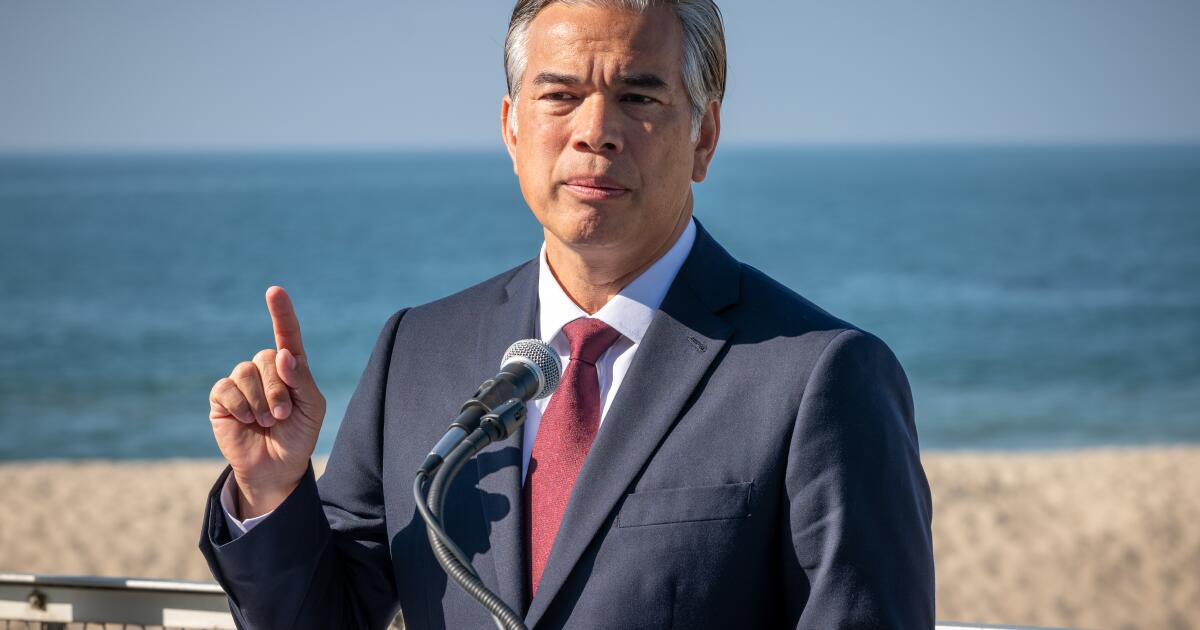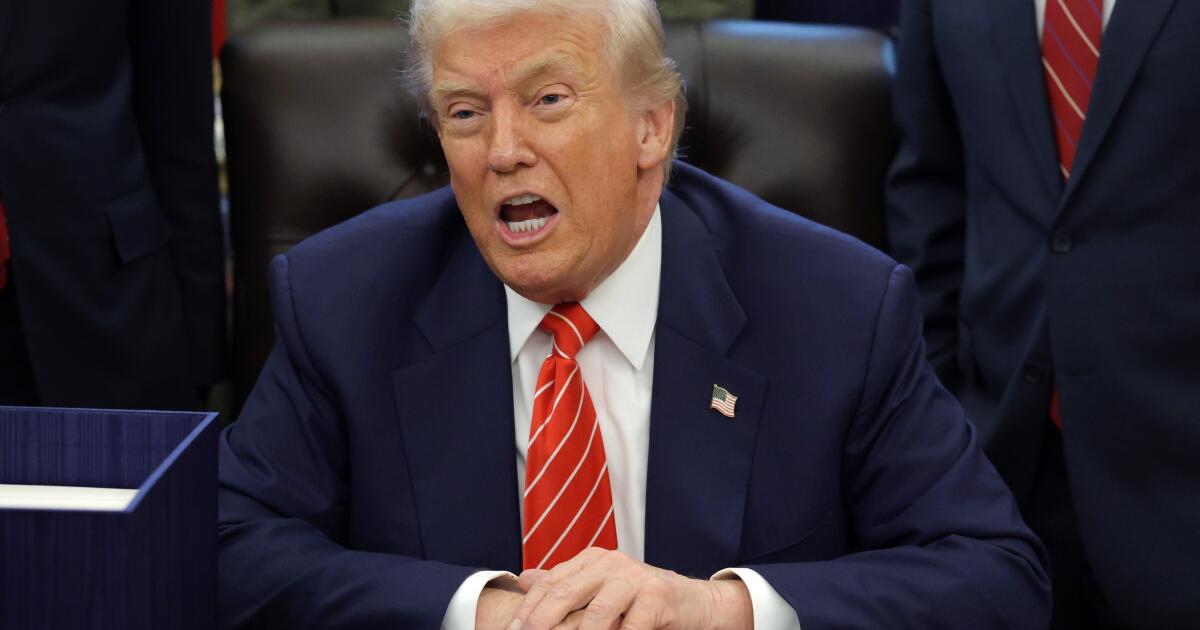Trump says California is full of fraud. Bonta pushes back
With the Trump administration reportedly in talks to create an anti-fraud task force for California, state Atty. Gen. Rob Bonta on Thursday vehemently denounced what he described as the administration’s “reckless” and “false” rhetoric about fraud plaguing the state.
At a news conference at the Ronald Reagan State Building in downtown Los Angeles, Bonta said the Trump administration’s claims that state programs are overrun by fraud and that its government was itself perpetrating or facilitating this fraud was “outrageous and ridiculous and without basis.”
Bonta said most states struggle with some fraud from outside actors, saying that “anywhere there’s money flowing there’s a risk” and that the state’s Department of Justice has thrown immense resources into cracking down on illicit activities and recovering funds for taxpayers.
As a politicized national fight over waste, fraud and abuse led by Republicans have targeted California and its Democratic leadership, Bonta and other state officials have moved swiftly to combat the claims.
In California, Bonta said, authorities have recovered nearly $2.7 billion through criminal and civil prosecutions since 2016, including some $740 million through Medi-Cal fraud related prosecutions, about $2 billion under the state’s False Claims Act, and an additional $108 million from a task force focused on rooting out tax fraud in the underground economy.
State authorities have frequently partnered with the federal government in the past on such investigations and welcome a good-faith partnership in the future, Bonta said.
CBS News reported on the creation of a California-focused fraud task force earlier this week, citing multiple unnamed sources familiar with the plans. The outlet, whose new editor in chief, Bari Weiss, has been aligned with Trump and spearheaded a major overhaul of the news organization, reported that the president plans to soon sign an executive order naming Vice President JD Vance as head of a group that would also include the head of the Federal Trade Commission as vice chairman.
Trump’s rhetoric fueled doubts about California programs and Gov. Gavin Newsom’s leadership at the start of the year, when he declared that “the fraud investigation of California [had] begun.”
On the president’s social media platform, in formal letters and in recent news conferences, officials in the Trump administration have alleged fraud in child care, hospice funding and unemployment benefits.
Last week, the topic took center stage again when Mehmet Oz, the administrator for the Centers for Medicare and Medicaid Services, posted a video accusing Armenian crime groups of carrying out widespread hospice fraud in Los Angeles.
That viral video received more than 4.5 million views on X.
Oz’s video received fierce backlash from California politicians and the local Armenian community, who collectively alleged that it contained baseless and racially charged attacks on Armenians.
The video shows Oz being driven around a section of Van Nuys where he says that about $3.5-billion worth of medicare fraud has been perpetrated by hospice and home-care businesses, claiming that “it’s run, quite a bit of it, by the Russian Armenian mafia.”
He also points to Armenian language signs, incorrectly referring to them as written in a cerulean script, and saying “you notice that the lettering and language behind me is of that dialect and it also highlights the fact that this is an organized crime mafia deal.”
Newsom filed a civil rights complaint against Oz on Jan. 29, asking the Department of Health and Human Services to investigate the “racially charged and false public statements” made in the video.
On Monday, California Sen. Adam Schiff followed suit, demanding an independent review of Oz’s alleged targeting of Armenian American communities.
“To suggest markers of Armenian culture, language, and identity are indicative of criminality underscores a discriminatory motive that could taint any investigation into fraud and incite the further demonization of the community,” Schiff said in a statement.
Glendale City Councilmember Ardy Kassakhian said in an interview that Oz’s statements feed into the Trump administration’s playbook of using allegations of fraud to sow racial divisions.
“This time the focus just happens to be the Armenians,” he said. “In places like Minnesota, it’s the Somali community.”
California has been investigating healthcare fraud since a 2020 Los Angeles Times investigation uncovered widespread Medicare fraud in the state’s booming but loosely regulated hospice industry.
From 2010 to 2020, the county’s hospices multiplied sixfold, accounting for more than half of the state’s roughly 1,200 Medicare-certified providers, according to a Times analysis of federal healthcare data.
Scores of providers sprang up along a corridor stretching west from the San Gabriel Valley through the San Fernando Valley, which now has the highest concentration of hospices in the nation.
The state Department of Justice has charged more than 100 people with hospice-related fraud since 2021 and shuttered around 280 hospices in the last two years, according to data from the California Department of Public Health.
But those shuttered hospices barely represent a dent in the massive hospice home healthcare industry. There are 468 hospice facilities in the Van Nuys area alone, according to the state database of medical facilities.
There are 197 licensed medical practices, including 89 licensed hospices, in a single two-story building located at 14545 Friar St. in Van Nuys — suggesting a concentration of fraudulent businesses.
When asked why the number of licensed medical practices in Van Nuys and at that address are so high, a spokesperson for the California Department of Public Health said that the department is committed to fighting fraud and unable to comment on pending investigation.
Recent turmoil in Minnesota has demonstrated the potential ripple effects of allegations levied by the Trump administration.
Ahead of sending in thousands of immigration enforcement agents into the Midwest state, Trump had repeatedly cited a fraud case involving funds for a child nutrition program involving COVID-19 pandemic relief funds.
He used the case, which involved a nonprofit where several Somali Americans worked, to vilify the immigrant community, even though the organization was run by a white woman. After the state became a lightning rod, Gov. Tim Walz dropped his reelection plans.
At Thursday’s news conference, Bonta described major cases in other states, such as $11.4 million healthcare fraud and wire fraud conspiracy involving a nursing assistant in Florida and a $88.3 million Medicaid fraud case in in Ohio involving over billing by a pharmacy benefit manager — to show abuse of state programs is not unique to California — or to blue states.
“We know Vance hails from Ohio, so maybe he should take a look in his own backyard before leading an unnecessary political stunt focused on California,” Bonta said. “We thought we should set the record straight.”
Times staff writers Melody Gutierrez and Dakota Smith contributed to this report.

